The surrender of the Swedish army at Perevolochnaya
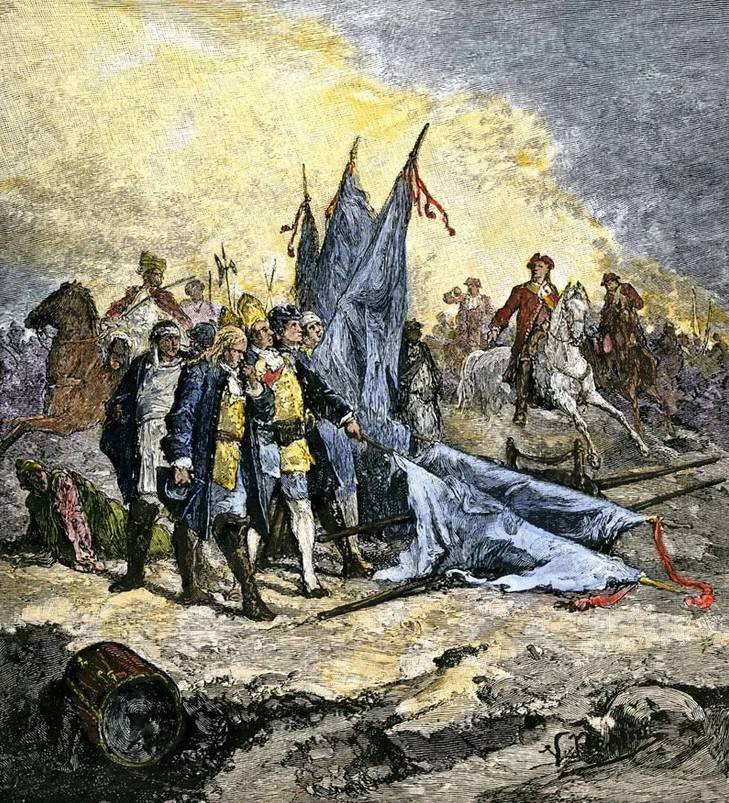
As we recall from the previous article ("Poltava accident of the army of Charles XII"), after the defeat at Poltava, the Swedish troops retreated to their wagon train, which was under the protection of 7 regiments near the village of Pushkarevka, located southwest of Poltava.
The Swedes, who at that time were next to Charles XII, report that at first the king did not look dejected, claiming that this "embarrassment" does not matter much. He even wrote a letter to his sister - Ulrike Eleanor (who would later replace him on the royal throne), which said between the cases:
The mood of Charles XII changed after the report that Field Marshal Rönschild, the head of the Campaign Office Pieper and "Little Prince Maximilian" were taken prisoner. Learning of this, the king exclaimed:

Maximilian Emanuel, Duke of Württemberg-Vinental, “The Little Prince” - “brother by arms»Charles XII. At the time of capture - Colonel of the Skonsky Dragoon Regiment
They did not learn anything about the real situation in Sweden at the end of August 1709, when a new letter from Karl, written in Ochakovo, arrived:
And only from foreign sources did the Swedes understand that their formidable army, which went with Charles XII to the Russian campaign, no longer exists.
But we will return on that great day of Poltava Victoria.
The retreat of the Swedish army from Poltava
Delighted with his victory, Peter seemed to decide to play giveaways with the Swedes: feasting feverishly with captive "teachers", he forgot to order the pursuit of the enemy army.
Thus, he repeated his mistake in the battle of Lesnaya, when, without organizing the pursuit of the retreating Swedes in time, he allowed Levengaupt to bring part of his corps to the king. But now, General Levengaupt was destined to limp the entire remaining army.
R. Bour and M. Golitsyn at the head of the Dragoon detachments were sent in pursuit of the Swedes only late in the evening. The next day, A. Menshikov was assigned to pursue the Swedes, who was entrusted with the overall leadership of the operation.
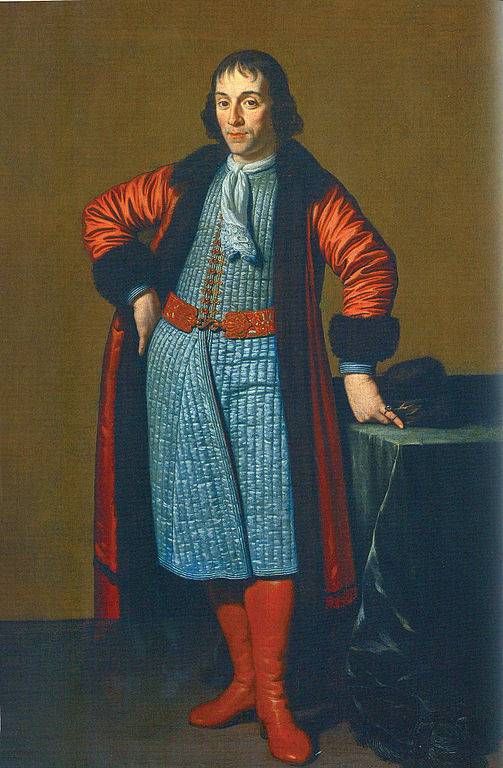
M. van Musscher. Portrait of A. Menshikov, painted in Holland during the Great Embassy, 1698
The one who would capture Karl was promised the rank of general and 100 thousand rubles.
And only on June 30 Peter I himself, at the head of the Ingermanland and Astrakhan regiments and accompanied by a company of the life squadron, also moved after the Swedes.
But on the first day, the Swedish army, practically uncontrolled and unchallenged by anyone, quickly retreated south along the coast of Vorskla.
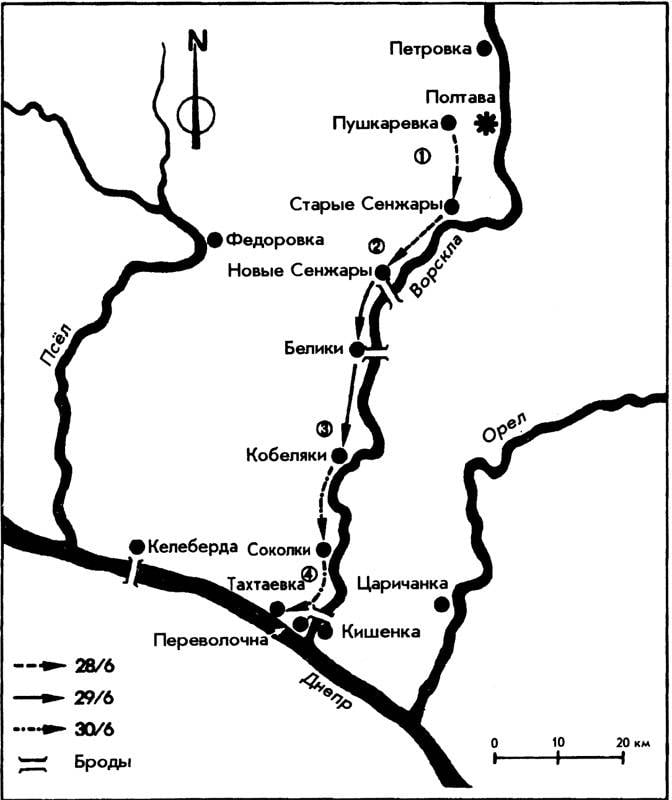
The path of the Swedish army from Poltava to Perevolochnaya
Suffering from leg pain and fever, Karl was among the remains of the Upland Horse Regiment. General Levengaupt retired from all affairs and did not even try to somehow manage the retreat of this still large enough army. As a result, "no one obeyed anyone, everyone was afraid only for himself and tried to break ahead."
On the way to the retreating Swedes, the regiment of Major General Meyerfeld, squadrons of Lieutenant Colonels Funk and Silverielm, who did not participate in the Poltava battle, joined.
To slow down the movement of Russian troops, Meyerfeld was sent to Peter I, who proposed to begin peace negotiations.
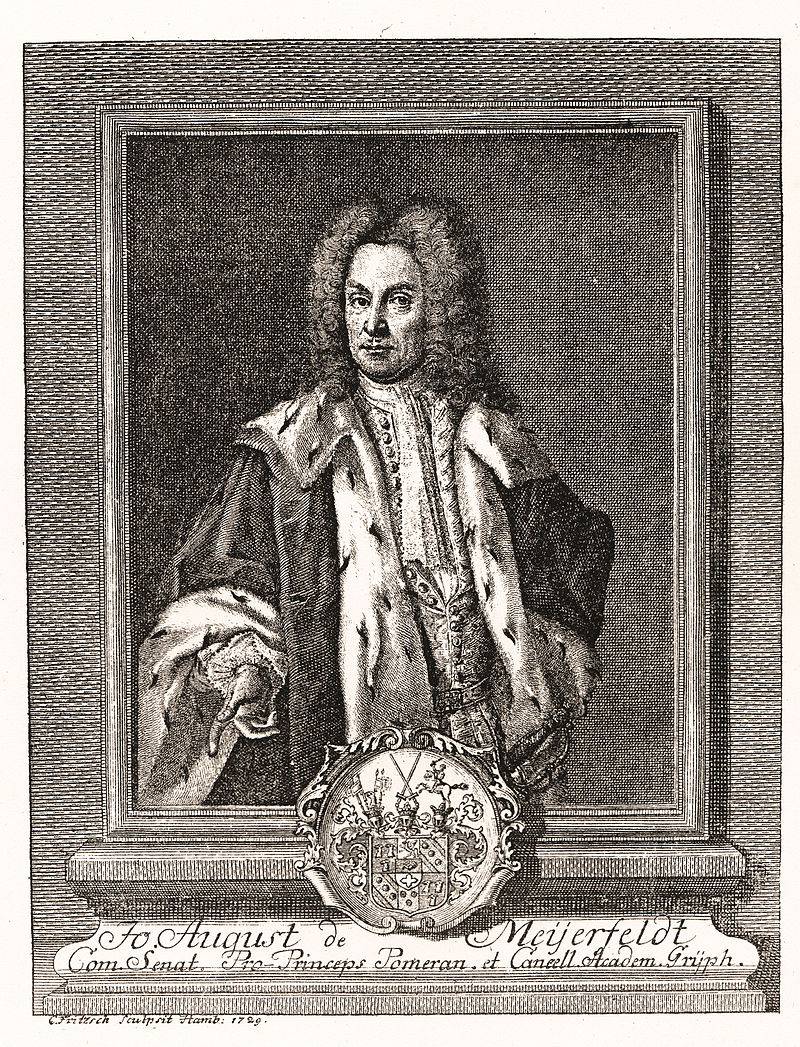
Johan August Meijerfeldt, portrait painted in 1729, during which time Meyerfeld was governor of Swedish Pomerania
The general said that the chief of the field office of Charles XII, captured by the Russians, was endowed with such powers. But Peter already understood that the Swedish king was almost in his hands and managed to detain the dragons Menshikov for only 2 hours.
To get to lands subject to the Ottoman Empire or the Crimean Khanate, the Swedes had to cross the Dnieper or Vorskla.
Recall that the Crimean khans belonged to the steppes of the Northern Black Sea region, and the famous island of Khortitsa, for example, was located on the border of the khan lands. But the Crimean peninsula itself belonged to the Tatars only partially: the territory of Gothia (with the center in Kef - Theodosius) and the former colonies of Genoa (Kerch with its environs) were part of the Ottoman Empire (Kefin eyelid)
The path to the possession of the Ottoman Port (via the Dnieper) was shorter, but this river was wider and deeper than Vorskla.
Axel Gillenkrok (Yullenkruk), sent for reconnaissance, found a relatively shallow spot and 8 ferries in Vorskla near Kyshenok. But some Cossack told him that the ruined city of Perevolochna on the Dnieper has an even more convenient place for crossing, where you can cross the river in carts, and Gillencrock went to look for this ford, ordering him to take the ferries with him. On the way, this "Ivan Susanin" was lost, and it turned out at Perevolochnaya that the river in this place is very wide and deep, and the carpenters who arrived with it found only 70 logs on the shore. Gillencrock sent a messenger, indicating to stop the army at Chicken, but was late. Pursued by the Menshikov dragoons, the Swedes were already approaching the Dnieper. Here, seeing that there was little chance of an organized crossing, the soldiers, in a panic, began to try to independently cross over to the other side. Some paid 100 thalers per place on ferries, or rafts and boats built, others - swam, holding on to the mane of horses - and many of them drowned. Then Mazepa and his young wife crossed over to the other side, as well as the Cossack colonel Voinarovsky. Part of the hetman’s property drowned, which later gave rise to rumors about Mazepa’s treasure, which many were looking for in those places.
Here, on the banks of the Dnieper, General Levengaupt caught an ermine climbing into his hat. He considered this beast a symbol of the Swedish army, which also “lured itself into a trap,” and from that time completely lost heart.

Adam Ludwig Levengaupt, in this portrait he is a major general, governor of Riga and has not yet lost a single battle (the first will be a defeat at Lesnaya)
Arriving at the Perevolochnaya Charles XII was inclined to give another battle, but the generals and officers who were with him persuaded him to cross to the other side. General Kreutz said that if the Russians came up with one cavalry (as it happened), the Swedes could fight back without Karl. If the whole Russian army comes, the presence of the king will not help the soldiers.
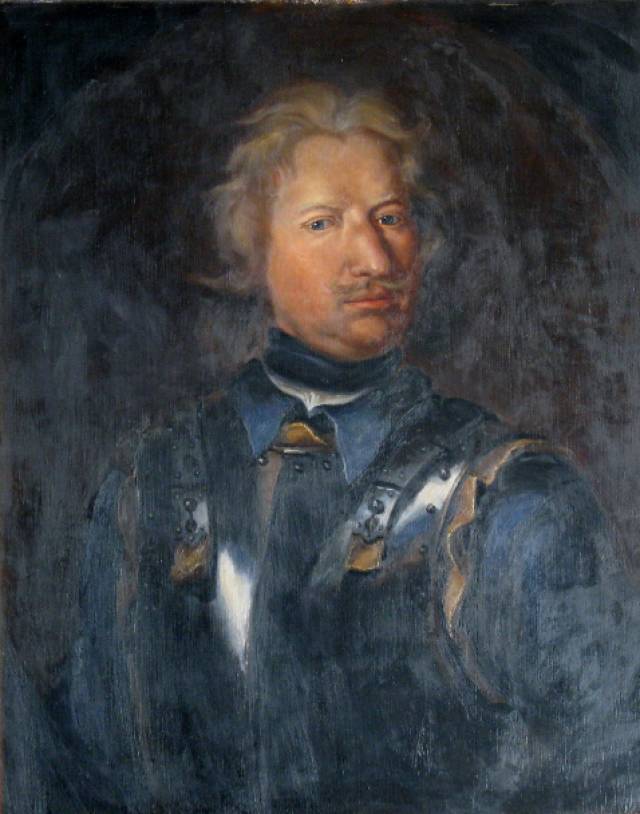
Baron Karl Gustav Kreutz, cavalry general
We agreed that Karl would expect his army in Ochakovo. Further, it was planned to move to Poland in the hope of connecting with the Swedish corps of General Krassau and the Polish troops Stanislav Leshchinsky. Thus, the size of the army could be increased to 40 thousand people. In addition, an order was sent to Stockholm to conduct an urgent recruitment of new recruits.
1500 Cossacks and 1300 Swedes crossed with the king, among whom were generals Sparre, Lagerkrona, Meyerfeld, Gillenkrok, commander of the Drabant Chord, secretary of the royal chancellery Joachim Duben.
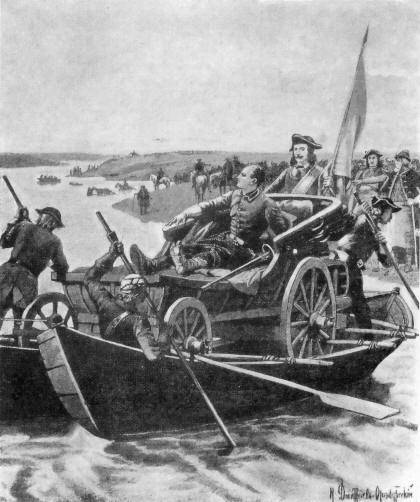
Crossing of Charles XII across the Dnieper
Remaining for the commander, General Levengaupt ordered to burn the carts, distribute supplies and treasury to the soldiers, but the Swedes did not have time to leave the Perevolochnaya. On June 30, 1709, three hours after the crossing of Charles XII, they saw horseback detachments of Alexander Menshikov in front of them, among whom were soldiers of the Semenovsky regiment mounted on horses. In total there were about 9 thousand people.
The surrender of the Swedes at Perevolnaya
Arriving at Perevolnaya, the Semenovites dismounted and stood in a square, the cavalry was located on the flanks.
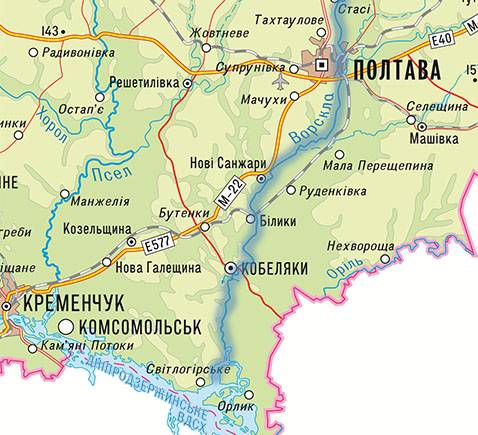
The arrow of the Dnieper and Vorskla on the modern map is the place of surrender of the Swedish army on June 30, 1709.
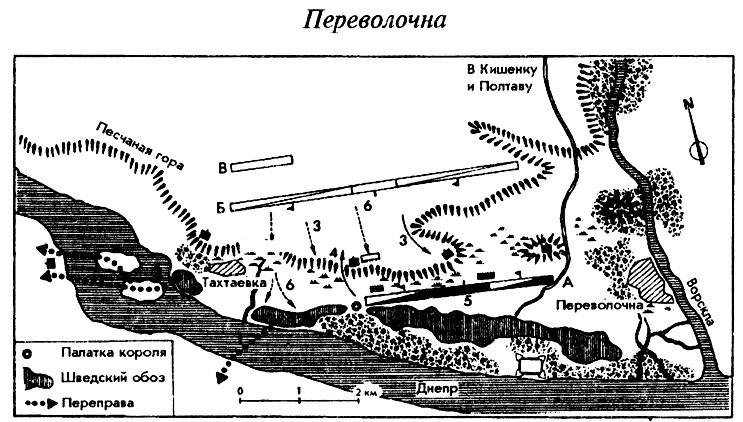
The surrender of the Swedish army at Perevolochnaya. Scheme from the book of P. Englund “Poltava. The story of the death of one army. " Line A - Swedes, Line B - Russian battle formation, Line C - spare horses of the Russian corps
There were much more Swedes (Swedish historians, which, in this case, you can probably trust, counted 18 people), and you often hear that the main culprit of their surrender was Levengaupt. However, in fairness, it should be said that among the Swedes panic began. General Meyerfeld’s dragoons refused to ride their horses. “They only looked at me as if I were crazy,” Levengaupt later complained.
Some soldiers desperately rushed into the water, others - in small groups went to surrender. A large part of the army, according to Levengaupt, “was in a stupor” and “no more than half of the lower ranks and officers remained with their banners”.
And yet there were units ready to obey the orders of Levengaupt. The noble regiment of Ramsverd and the regiment of Wennerstedt were lined up for battle, and the dragoons of the regiment of Albedil, according to eyewitnesses, calmly awaited orders, lying by saddled horses and reading prayer books.
According to the most conservative estimates, Levengaupt would be able to gather forces equal to 6-7 regiments (this is about half the army that was with him), and either drive away the Menshikov detachment (which, of course, would inspire other soldiers who lost their spirit), or break through with those who had remained combat-ready connections to the intestines.
The Swedish general Kreutz, who climbed the hill to clarify the situation, claimed that the Russian cavalry was extremely tired of the long passage: some horses literally fell down from fatigue. The powerful blow of the fresh cavalry units of the Swedes could be fatal for the Russian dragoons, but the morally broken Levengaupt did not dare to give such an order. Instead, he gathered regiment commanders and asked them to answer what they think about the relatively mild surrender terms proposed by Menshikov, and can they vouch for the reliability of their soldiers? Those, in turn, declaring personal allegiance to King Karl, began to blame everything on the soldiers, saying that they either put down their guns at the sight of the enemy, or could not defend themselves due to lack of ammunition, and only a few assured the commander that their subordinates ready to fight.
Unsatisfied with their answers, Levengaupt now addressed the same questions directly to the soldiers, who were at a loss, and were divided in opinions. Many took this as a sign of hopelessness of the situation in which they found themselves - after all, the charter of the Swedish army forbade not only to surrender, but even to retreat: the officers “had the power to deal with such rebels, because they must either fight and die at the hands of enemies of the state, or fall from the retaliation of the commander. " Previously, generals and colonels were not interested in their opinions and never asked about anything.
Albedil’s life-dragoons (those who read the prayer books while attuning to the battle) said that they would “do everything in their power”, but most of the soldiers were gloomy silent, and this further increased Levengaupt’s anxiety and insecurity. He again gathered the officers, who now agreed that "it is better to surrender on any terms of honor, than to continue to experience happiness with arms."
According to the drawn up agreement on surrender, the Russians were transferred weapons, horses and the entire convoy. As trophies, Menshikov received 21 guns, 2 howitzers, 8 mortars, 142 banners and 700 thousand thalers (some of this money belonged to Mazepa).
Private property of the Swedish army was left personal property and promised the possibility of exchange for Russian prisoners of war, or ransom. The officers, in addition, were promised maintenance at the expense of the royal treasury. But they took away jewelry, gold and silver utensils, gold and silver brocade, sable fur coats and skins ("acquired by overwork" during a trip to Ukraine and Poland).
The Cossacks who joined the Swedes were regarded as traitors, and the treaty did not apply to them.
Thus, the 49 best Swedish regiments ceased to exist in the four days that elapsed from the Poltava battle, until the surrender at Perevolnaya.
Charles XII wrote to his sister that
And Levengaupt, who did not believe in the possibility of resistance, then justified himself by saying that he was more afraid of the king’s wrath than “the omniscient God, who severely asks for intentional murder.”
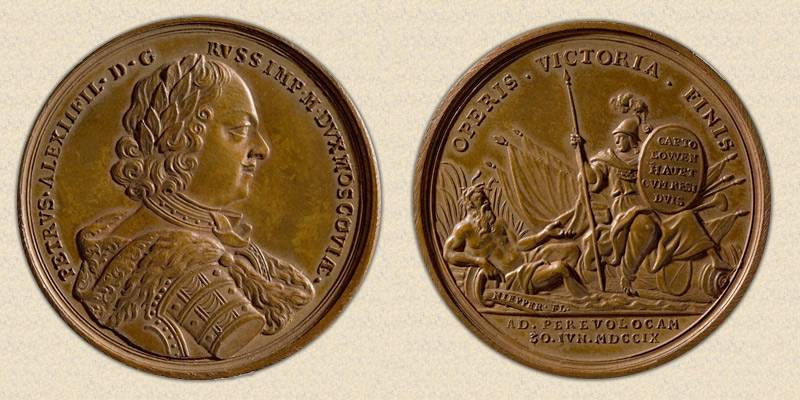
Medal minted in Russia in honor of the capture of General Adam Levengaupt
Having concluded a surrender agreement, Menshikov, following the example of Peter I, arranged a feast for generals and senior officers of the Swedish army. During this dinner they had the pleasure of seeing the sad picture of the disarmament of their once formidable army. The infantrymen laid down their weapons in front of the formation of the Semenovsky regiment: they saluted the muskets and lowered them to the sand, after which they removed swords and cartridge rifles from themselves. Squadrons of cavalrymen, one after another, marched in front of a line of R. Bour dragoons and threw timpani, standards, swords and carbines onto the ground in front of them. According to eyewitnesses, half of the soldiers threw weapons with a feeling of obvious relief, others with indignation, some of them cried.
The Flight of Charles XII and Mazepa
On July 1, 1709 (the day after the surrender of the Swedish army), Tsar Peter I himself arrived at the Perevolochka. He ordered Major General G. Volkonsky, at the head of 2 thousand “draconian dragoons,” to continue the persecution of Charles XII, and Field Marshal Lieutenant G.fon der Loach in Volyn was sent an order to block the king’s path to Poland.
On July 8, Volkonsky caught up with a mixed detachment of Swedes and Cossacks (2800 people) at Bug and killed most of it, 260 people were captured and only about 600 (including Karl and Mazepa) managed to cross to the other side.
Charles XII will soon end up in Bender, where he will at first be warmly received by the Ottomans, but very soon the Sultan will bitterly regret his decision to grant asylum to the inadequate Swedish king. His long stay in Turkey was described in an article. "Vikings" against the Janissaries. The incredible adventures of Charles XII in the Ottoman Empire.
Mazepa will die in Bender on September 21 (October 2), 1709. By order of Peter I, a “order of Judah” weighing 10 pounds was made for him in Russia, and the “Cross of Ivan Mazepa” was established in Ukraine on March 26, 2009 by order of the third president of this country V. Yushchenko. Among the “laureates” of this dubious (from the point of view of every normal person) award was Mikhail Denisenko, excommunicated in 1992, better known as Filaret. This is his cunning patriarch of Constantinople Bartholomew cleverly spent with the delivery of the enslaving tomos:
Since in Soviet times, Filaret gratefully accepted the Order of Friendship of Peoples (1979) and the Order of the Red Banner of Labor (1988) from the government, the presentation of the traitor's cross to him seems quite logical and justified.
Ivan Skoropadsky became the new hetman of Left-Bank Ukraine.
At his request, Peter I issued a manifesto on March 11, 1710, in which it was forbidden to insult the people of Little Russia, reproaching him with betrayal of Mazepa.
Swedish prisoners at Perevolnaya
How many soldiers and officers of the army of Charles XII were captured by Perevolnaya?
E. Tarle wrote:
The Swedish historian Peter Englund gives the following figures:
Officers - 983.
Non-commissioned officers and soldiers - 12 (including 575 cavalrymen).
Nestroyevs - 4809 people, including 40 pastors, 231 musicians, 945 masters of various specialties, 34 courtiers of Charles XII and 25 royal footmen, as well as grooms, horsemen, clerks, furiers and others.
Women (wives of soldiers and officers) and children - 1657.
Thus, the number of prisoners reaches 20 thousand people (together with those who surrendered at Poltava - about 23 thousand).
Three generals were captured under Perevolnaya: Levengaupt, Kruse and Kreutz. Later Quartemaster General Axel Gillenkrock joined them, whom Charles XII sent with a small detachment to the Polish border. In Chernivtsi, he was captured by the Russian detachment and taken to Moscow.
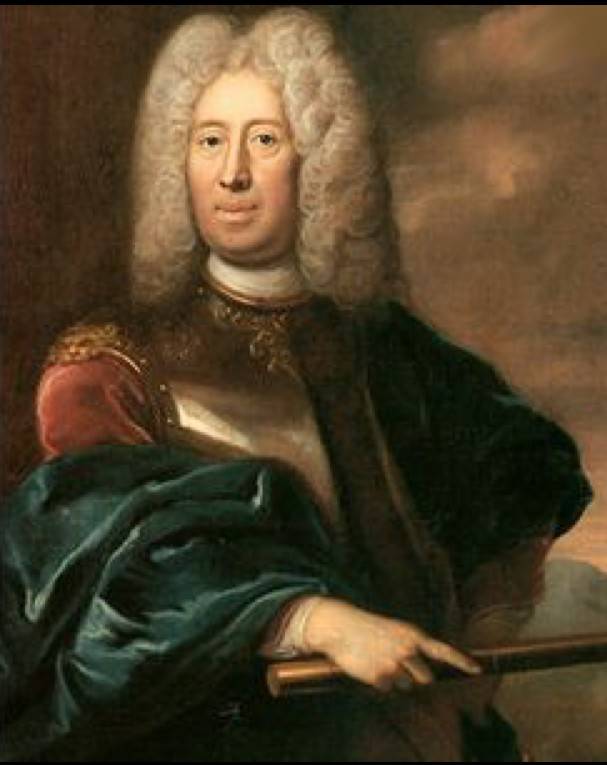
Axel Gyllencrock (Yullencrook)
Recall that during Poltava, Field Marshal Rönschild, generals Schlippenbach, Roos, Hamilton, Stackelberg and the head of the Royal Campaign Office Karl Pieper were also captured.
In total, during the years of the Northern War, approximately 250 thousand people of various nationalities were captured in Russian, among whom were “non-combatants” - attendants (blacksmiths, carpenters, horsemen, laundresses and others), and residents of some border cities resettled deep into Russia. The name of the most famous laundress, which the Russians got as a trophy, is familiar to everyone. This is Marta Skavronskaya, who was lucky in Marienburg to draw the attention of Count B. Sheremetev (but there is evidence that another hero of Poltava, R. Bour, became her first patron). This woman gradually rose to the rank of the Russian Empress, surpassing even the spoiled child of Alexander Menshikov in her fantastic career.
The fate of the Swedish prisoners in Russia and the end of the Northern War will be described in the following articles.
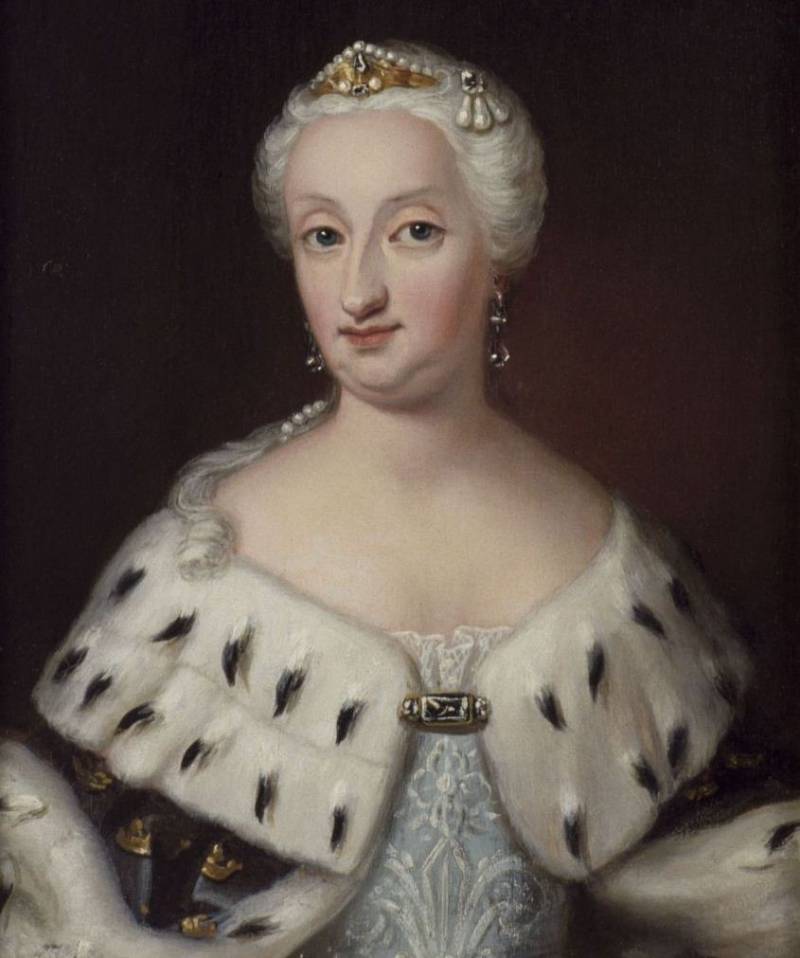
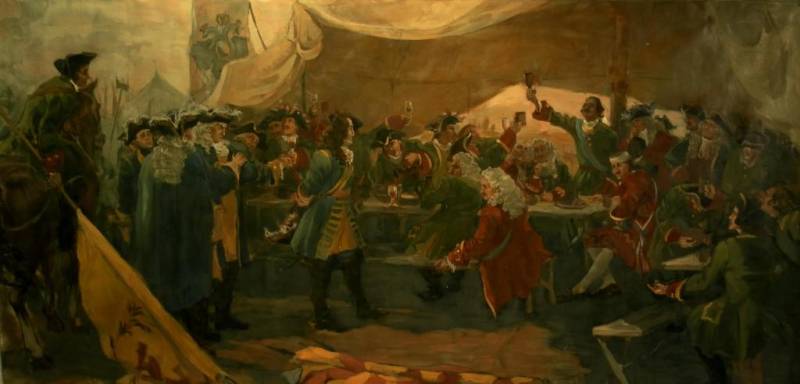
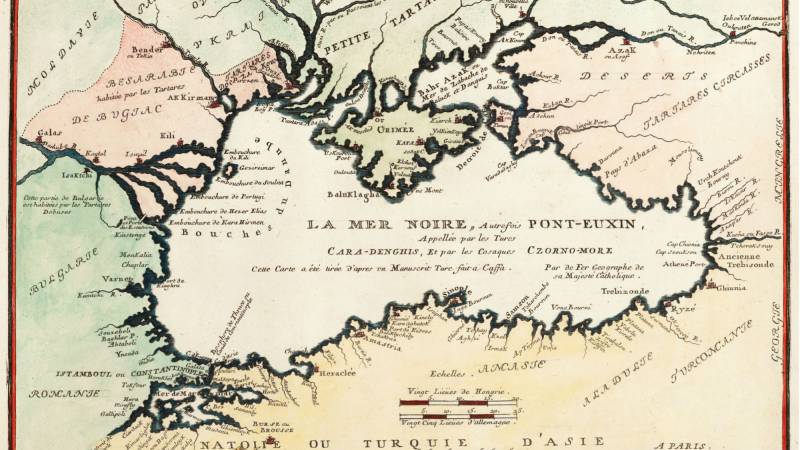
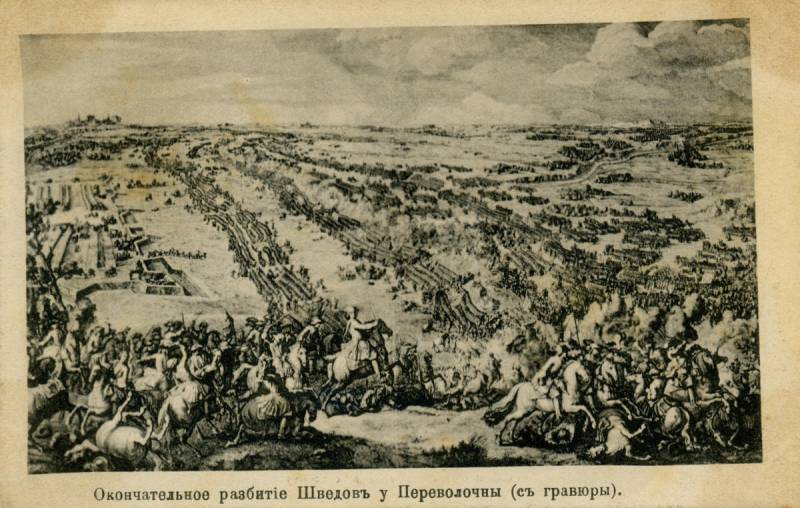
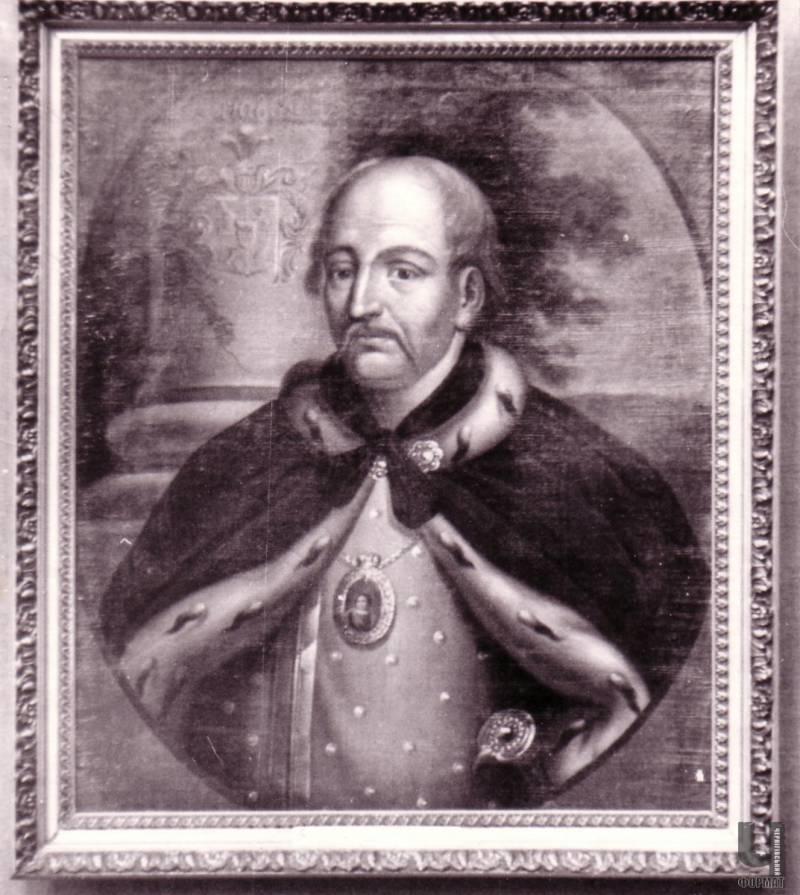
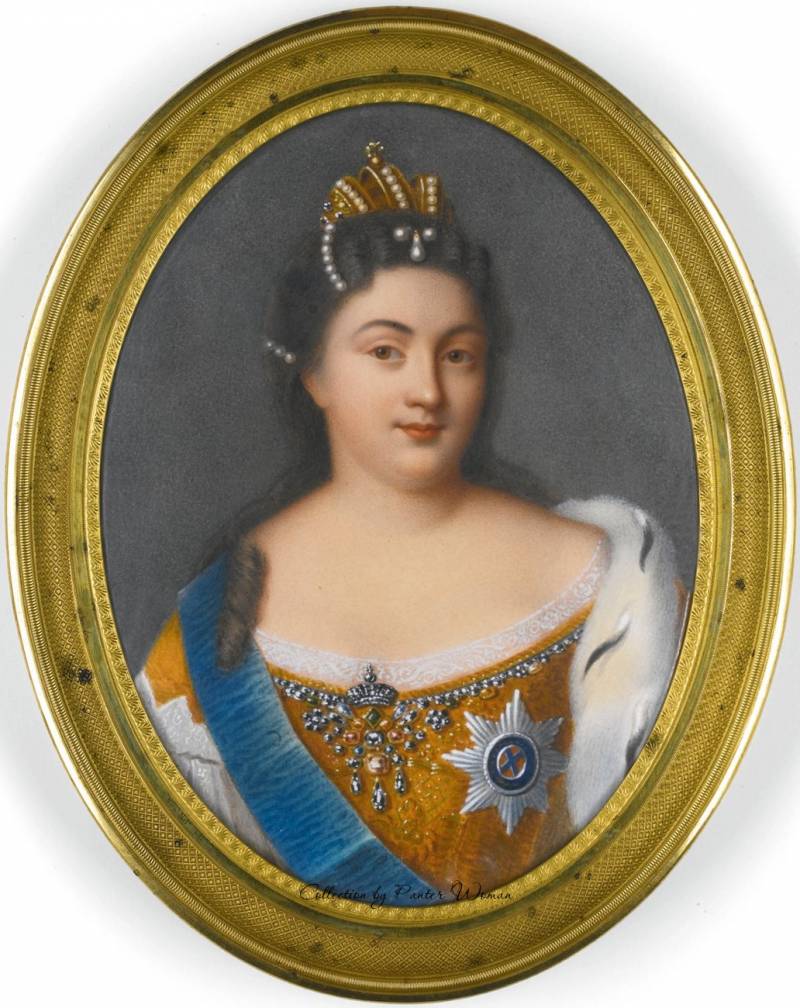
Information